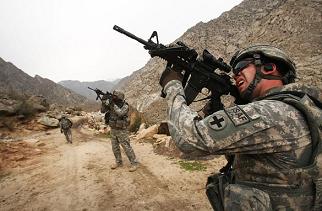The London Conference on Afghanistan: Rebranding an Unpopular War

Lawrence Cannon, Canada’s foreign minister, is on his way to London for a major international conference on the future of Afghanistan, January 28. Hilary Clinton and other high level representatives from the NATO countries will be present, as will embattled Afghan President Hamid Karzai. One wonders if this major global media focus on Afghanistan was part of the Harper government’s calculation in proroguing Parliament. The torture and abuse of Afghan detainees is also an issue in several European countries, and so the less riled up the Canadian press corps is from any fresh revelations back home, the better.
The agenda of the London gathering has recently been expanded to include a special session on Yemen. This in itself ironically exposes the illogic with which the expansion of the war in Afghanistan has been sold to the western public.
After all, Obama’s announcement of an additional 30,000 troops to the occupation of Afghanistan was explained with the rationale that it was vital for national security. Without a ramping up of the war, the world was told, a “safe haven” for terrorists might emerge. ‘Fight them over there or you will have to fight them over here.’ And yet Umar Farouk Abdulmutallab, the thwarted, Nigerian-born “underwear” bomber is said to have links to Yemen, so we must fight them there as well.
The “deny Al-Qaeda a safe heaven” justification opens up nearly infinite new potential fronts in the global “war on terror,” a term that has been dropped from White House press releases while its aggressive and counter-productive mentality remains in place.
On Afghanistan, the London conference is not the first of its kind, and likely won’t be the last. Its real raison d’être is to help rebrand the Afghan War, which remains unpopular in the majority of NATO countries. As Robin Beste of the UK Stop the War Coalition argues, “It’s a makeover aimed at turning the tide of public opinion, running so strongly against a war which is clearly futile and unwinnable. In reality the warmongers are gathering for a war council masquerading as a peace conference.”
Public Opinion Ahead of Politicians
Over the course of 2009, the bloodiest year of the eight since the invasion of Afghanistan began, public opinion in the UK in particular turned against the war. In Canada, anti-war sentiment remains strong, despite the fact that the New Democratic Party has quieted its opposition. The party leadership’s near-silence on the war itself – the NDP has loudly denounced the Conservatives on detainee abuse – can I think partly be explained by the “Obama factor,” a reluctance to be critical of the new president. But this is no time to remain silent in the face of governments that seem intent on more war and seemingly intent on ignoring the lessons of Afghanistan’s long history of resisting foreign occupation.
The history of the past decade alone can provide plenty of lessons about the real problems that plague Afghanistan. In 2001 Bonn, Germany played host to another conference of the big powers, where they established the road map to a post-Taliban Afghanistan. From the beginning, the Bush administration’s strong arm was evident: warlords and their representatives were allowed to participate, while women’s leaders were marginalized.
Sonali Kohatkar and James Ingalls, in the book Bleeding Afghanistan, describe Bonn as “ushering in yet another ominous era for women” and “silencing the voices of civil society.” Instead of progressive change, they write: “Karzai’s post-Taliban rise was purchased by allowing Northern Alliance warlords and regional militia commanders to regain military power in the countryside, and by granting them immense political power in government, squelching the hopes of most Afghans.” Pakistani journalist Ahmed Rashid reported that the CIA set-up communications equipment so that Karzai, who was still in Kandahar at the time, could address the delegates in Bonn. Soon after his selection, Karzai was flown to Kabul in a U.S. military plane (see Rashid’s Descent Into Chaos for details). And thus the seeds of today’s Afghan quagmire were sown.
This week’s London conference will exclude voices opposed to the NATO intervention and the continued domination of warlords. Its whole design, under the veil of rhetoric about handing over power to Afghans, is to salvage the NATO operation and ensure a regime that is pliant to U.S. and western interests.
It will be interesting to watch how Karzai and his foreign sponsors interact. Since Bonn, he has been their man in Kabul. But the strain and sniping between the puppet and his puppeteers has been mounting. The blatant electoral fraud of last year and the rampant corruption of Karzai’s regime has been an embarrassment to his foreign masters. Meanwhile, the Afghan president has grown increasingly vocal about criticizing NATO air strikes that have killed countless civilians and wounded his government’s popularity.
One aspect of Karzai’s tenure that doesn’t get enough coverage is the blatant nepotism. This should concern Canadians, since the most powerful man in Kandahar Province, where our troops are deployed, is the president’s brother Ahmed Wali Karzai, whose ties to drug trafficking have been widely reported and whom the New York Times last year exposed as being on the CIA’s payroll. In other words, Canadian troops are killing and dying to prop up Kandahar’s Al Capone. That is something that no amount of finely crafted press statements from London is going to change. And that is just one reason for Canadians to demand, once Parliament is finally reopened, that a new motion on Afghanistan be introduced by the opposition parties, one that will reflect the wishes of the Canadian people to bring the troops home much sooner than the end of 2011. •
Derrick O’Keefe is a Vancouver-based writer and social justice activist. Derrick is the co-chair of the Canadian Peace Alliance, the country’s largest network of anti-war groups, and a coordinating member of the Vancouver StopWar.ca Coalition.

